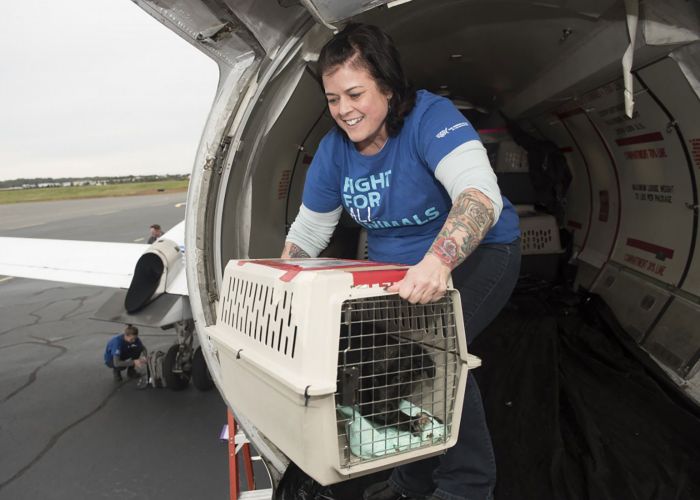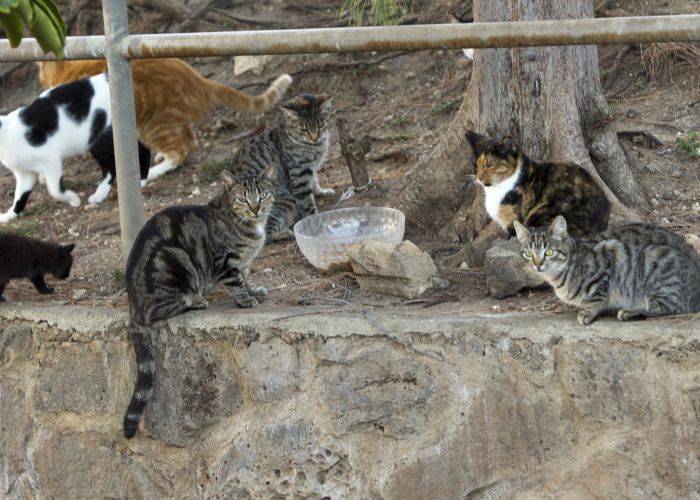Greyhound racing nears the finish line
In the wake of the Florida ban on dog racing, a cruel ‘sport’ takes its final lap
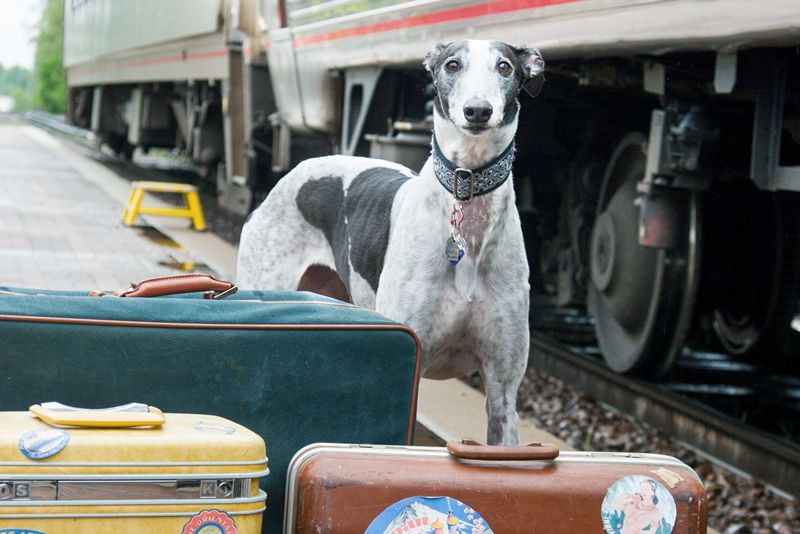
Midge Grinstead was serving as the director of the Lawrence Humane Society in Kansas when calls came in about two “body dumps”—one in Douglas County and one on the Leavenworth-Douglas county line.
“They were all greyhounds,” she says. “Their ears had been cut off. Their throats had been slit. They were all dead, and that was my first initiation into what greyhound racing was all about, and that’s the disposal of animals who don’t win you money.”
That was 15 years ago, but nothing Grinstead has seen in the years since has changed her view. “I don’t like greyhound racing,” she says flatly. “I don’t like when animals are expendable.”
While Kansas hasn’t had an active track since 2008, as home to the pro-racing National Greyhound Association and dozens of breeding farms, it’s been the source of a majority of greyhounds bred for racing in other states. Since taking on the role of Kansas state director for Humane World for Animals a decade ago, Grinstead has devoted “a huge amount of time” to battling industry attempts to evade scrutiny and reopen dog tracks.
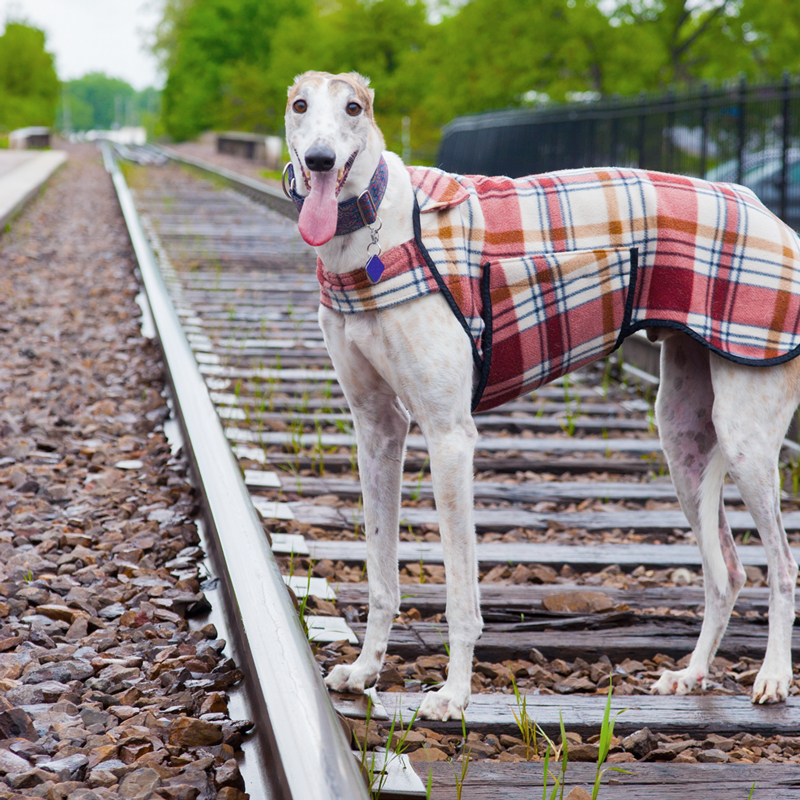
Her first big victory came in 2012 with the passage of legislation that classified greyhounds as dogs. “People say, ‘Big deal, of course greyhounds are dogs,’” she says, but the memory still gives her goosebumps. Before then, greyhounds weren’t even classified as animals under state law and were exempt from anti-cruelty protections. “You could beat them to death with a baseball bat, and it was perfectly legal,” Grinstead says. “The industry fought us tooth and nail, and we ended up coming out on top.”
Over the years, Grinstead has countered every attempt to reopen dog tracks in her state and to prop up the industry with casino profits. And since pro-racing interests advance about half a dozen state and local bills every year with that purpose, she has to be vigilant.
She remembers how last year around 4 p.m. on the Friday before Labor Day weekend, there was an announcement out of Wichita that they were going to have a vote the following Tuesday morning. The topic at hand: Adding a question to the November ballot about opening the Wichita track and putting a casino there. “That was horrific,” Grinstead says. “We worked 14 hours every day making sure people were calling and emailing and showing up that morning to testify against that.”
“You could beat them to death with a baseball bat, and it was perfectly legal.”
—Midge Grinstead, The HSUS
The year before, she successfully fought against two sports wagering bills that were introduced in the state legislature. “It was very deceptive, because nowhere in the bills did it talk about greyhound racing at all. When we delved into them, both had sections referencing statutes that said you must have so many greyhound races per day, per week, per year in order to offer other forms of gambling. That’s how they were trying to sneak them in.”
In the meantime, she and her network of allies across the state—including animal services officers, shelter leaders and rescuers—have worked to educate legislators about the industry’s inherent cruelty, making sure that they understand that the dogs “aren’t sleeping in homes; they’re not given steaks.”
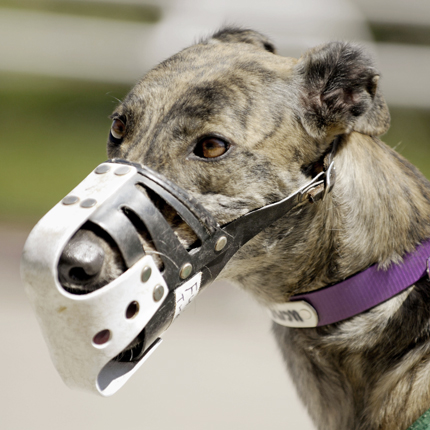
Now Grinstead can finally envision a time in the not-too-distant future when her time and energy can be redirected toward advancing other animal welfare reforms in her state.
The tipping point occurred not in Topeka, but a thousand miles away in Tallahassee. In 2018, local animal welfare advocates and national organizations, including the HSUS, Humane Society Legislative Fund, Doris Day Animal League and GREY2K USA, made a calculated gamble. They formed a coalition and invested enormous energy and resources into a ballot campaign in Florida, which had 11 tracks at the time and served as the linchpin of the U.S. dog racing industry, says HSUS Florida senior state director Kate MacFall.
The strategy paid off that fall when Florida voters overwhelmingly sided with the dogs. Amendment 13 ended the requirement that casinos hold live dog races in order to offer other forms of gaming and phased out all dog racing over two years. While the industry quickly launched a flurry of lawsuits attempting to overturn the law, all of them failed. “We did it right,” MacFall says. “The voters spoke and said, ‘This is not OK.’”
Most of the Florida tracks have since closed; the remaining three will shut down by the end of this year. And just as animal advocates predicted, the Florida amendment has had a ripple effect throughout the nation. By next year, just three states (Arkansas, Iowa and West Virginia) will have active tracks—none of which is expected to stay in business long.
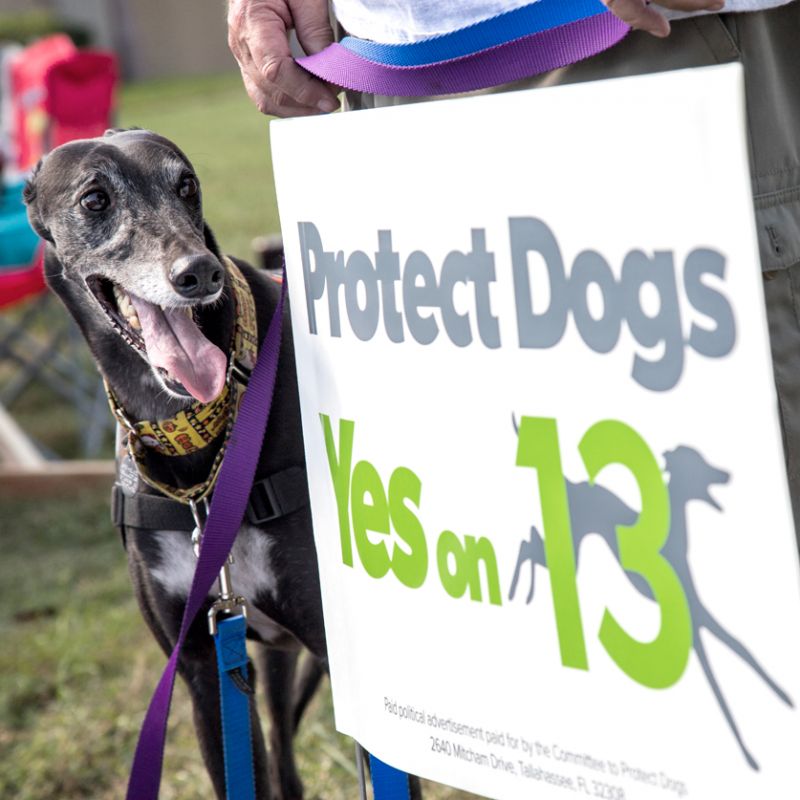
The end can’t come soon enough for Robyn Stone, president of the all-volunteer rescue Kansas City Retired Greyhounds as Pets.
Racing careers are short, and the industry produces a constant stream of discards—dogs who are injured, who are no longer winning races, or who were never fast enough to make it to the track. The lucky ones end up with groups like KCREGAP, which has found homes for more than 5,000 greyhounds.
“We’d be OK if we were put out of business,” Stone says. “That’s our end goal: no need for greyhound rescue.”
In the meantime, KCREGAP and similar groups are preparing for a potential surge in the number of dogs who need rescuing as tracks shut down. Soon after the Florida measure passed, the HSUS established the Greyhound Protection Fund to help the rescue community rise to the challenge.
The extra money makes a difference, says Stone, whose group received a $5,000 grant that enabled it to take in 10 additional dogs. By the time they land with KCREGAP, she adds, the dogs are typically in poor shape and require extensive veterinary care—not only surgeries for untreated injuries but severe hookworm infestations and “horrific” teeth.
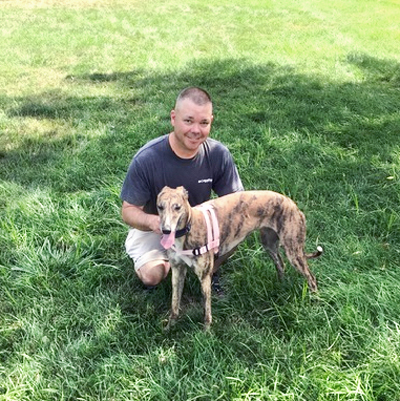
Fortunately, while no one knows how many dogs are bred for racing in the U.S., MacFall believes the number has already dropped significantly. Tractor trailers hauling dogs from breeders in Kansas to tracks in Florida are no longer a common sight. “I used to see them all the time on I-10, several in a row,” she says.
That’s good news not only for greyhounds and their dedicated rescuers, but for the entire animal welfare field, says Lindsay Hamrick, HSUS director of shelter outreach and engagement.
“When an industry places their profits over the long-term quality of life of those dogs, ultimately it’s your nonprofit shelters and breed rescue groups that have to absorb the costs,” Hamrick says. “It’s tens of thousands of dollars that otherwise could have been utilized to help other homeless pets and owner support programs.”
Now, after decades of intense effort by animal advocates across the nation, the cycle of cruelty and drain on nonprofit resources is coming to a close, she adds. “Greyhound racing is on its way out.”




